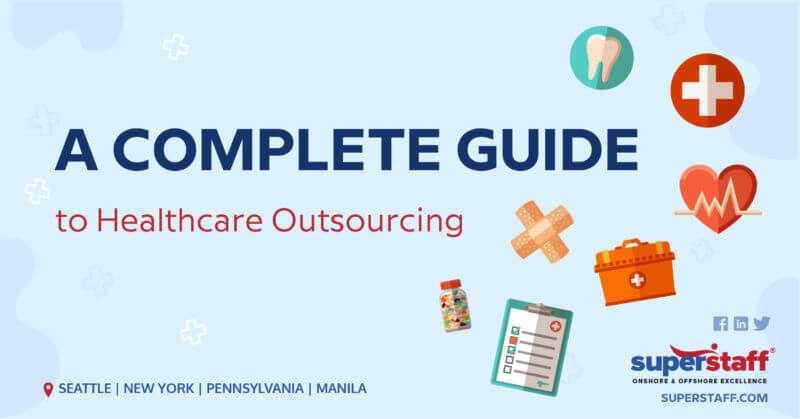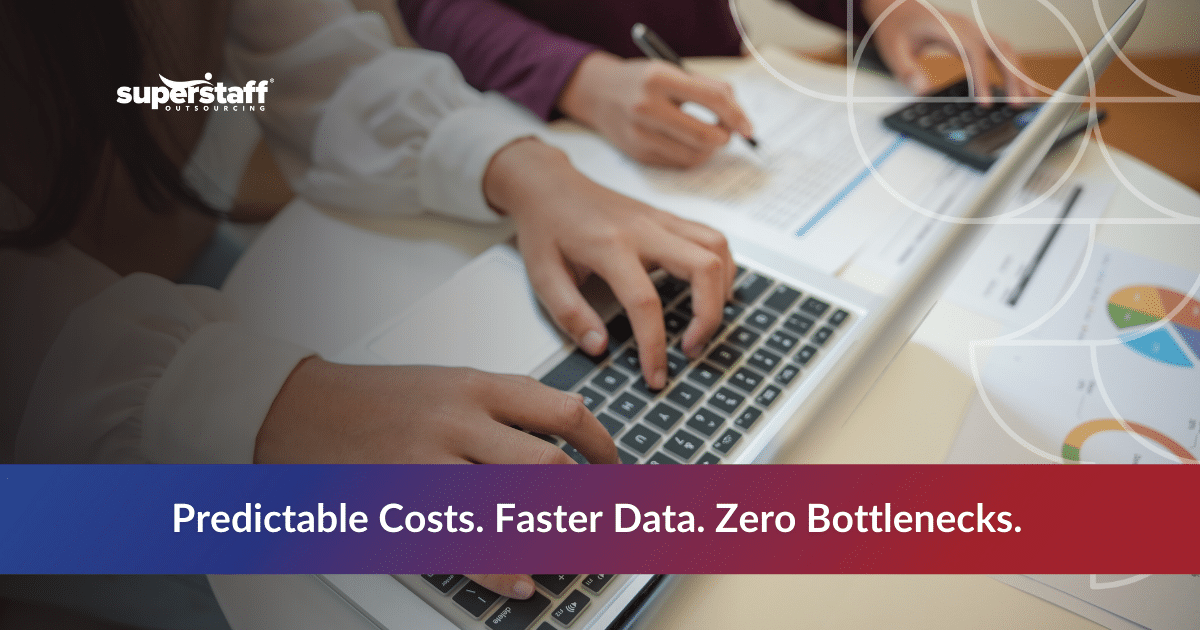
In the aftermath of the last 18 months, certain inefficiencies that have long contributed to the high cost of healthcare and poor patient experience have come to light. Industry analysts recommend healthcare organizations reinvent their business models to overcome the constraints of the traditional hospital-centered setting. In this article discover more about this new healthcare ecosystem and how healthcare outsourcing perfectly complements the post pandemic era.
Healthcare Outsourcing: What It Is, Its Advantages, and Its Role in Shaping the Emerging Healthcare Ecosystem
What Is Healthcare Outsourcing?
Healthcare outsourcing is the practice of delegating non-urgent clinical or non-clinical functions to an external service provider or healthcare business process outsourcing company. By incorporating healthcare outsourcing solutions into their business models, organizations minimize costs, speed up task completion, and streamline operations.
Brief Background of Healthcare Outsourcing
Outsourcing is not an entirely new concept in healthcare. Most hire external contractors to perform janitorial service, utility maintenance, housekeeping, and other tasks essential for running a hospital system. But due to the segmented and ‘high touch’ nature of the industry, healthcare is the last sector to adopt outsourcing for client-facing service and business functions.
The growth of healthcare outsourcing started when hospitals and clinics began to store and manage patient records using technology. Since then, healthcare outsourcing services gradually became a common strategy to enhance profitability and service delivery. In 2020, the U.S. healthcare outsourcing market reached $52 billion. It is expected to grow up to $66 billion by 2025.
Telehealth: The Biggest Driver of Healthcare Outsourcing
One of the most significant functions outsourced today is telehealth. Also known as telemedicine, telehealth is the practice of performing various non-emergency healthcare services, such as consultation, triaging, and diagnosis, through various remote means. Some of the benefits of telehealth are as follows:
- Promotes safety and offers convenience to patients and healthcare providers
- Helps organizations comply with the safety guidelines set by regulating bodies
- Preserves scarce personal protective equipment and limits the usage of hospital facilities to crucial cases
- Expands patients’ ability to access specialty and behavioral health services
- Improves overall healthcare delivery
- Potentially reduces the cost of healthcare services
- Prevents the spread of infectious diseases
Since the pandemic, telehealth has been the most influential trend in healthcare. According to a McKinsey report:
- Between February 2020 and April 2020 alone, overall telehealth utilization increased by 78 times.
- Telehealth usage in 2020 was 38 times higher compared to pre-pandemic.
- Venture capital investments in virtual healthcare were three times higher in 2020 than in 2017.
Telehealth is likely to stay post-pandemic. As it gains positive responses from consumers and healthcare providers, stakeholders see the viability of virtual healthcare delivery. Recent studies show that:
- 40% of consumers say they will continue using telehealth.
- As of April 2021, about 85% of physicians conduct telehealth, and around 57% want to continue doing so.
The remote patient monitoring market is expected to reach $31 billion by the end of 2023 and $85 billion by 2026.
Common Tasks Delegated to a Healthcare BPO
Medical Data Entry
Data is essential in the healthcare setting. Physicians and other healthcare professionals use patient information as a basis for diagnosis and treatment recommendations.
Medical data entry tasks involve collecting all information related to the patient to build their medical portrait. This portrait is used to monitor patient progress and as a reference for other healthcare service providers. It usually includes:
- Personal Patient Information
- Specimen Information
- Medical History
- Surgery Records
Medical Billing and Coding
Medical billing and coding are distinct even with people using it interchangeably.
Medical billing is a standard payment practice in the U.S. health system. It is a necessary process in collecting payments for various healthcare services, such as consultations, tests, and treatments. Medical billing invoices are usually submitted to health insurance companies, but they may also be submitted directly to the patient.
On the other hand, medical coding involves converting physician’s notes and diagnoses into insurance codes. Insurance and healthcare providers use codes to streamline healthcare service billing and make it more accurate. There is a unique code assigned for every service, and for each code, there is an equivalent fee.
Medical Records Transcription
Health professionals don’t have the time to attend to paperwork. For this reason, medical diagnoses and reports are usually recorded as audio files in real-time for transcription later. The written documents serve as a useful reference that can be shared with other physicians. Some of the common documents transcribed are:
- Clinical Summaries
- Physician’s Findings
- Surgery Notes
Due to the high cost of hiring an in-office assistant to perform medical transcription, some healthcare professionals transcribe notes at the end of the day. This practice puts the records at risk of inaccuracies and the professionals of burnout. To prevent these situations, many providers tap a healthcare BPO to handle medical records transcription.
Receivables Management
Complex reforms in the U.S. healthcare system have made managing claims challenging for billers. This reality is one of the reasons why many healthcare providers engage healthcare BPOs for receivables management.
Receivables management is the process of ensuring that claims are processed and paid on time. Healthcare outsourcing providers help health professionals maintain a healthy cash flow by preventing unprocessed claims from filling up.
Adjudication
Adjudication is the process of determining the financial responsibilities of the insurance company to the healthcare provider based on the patients’ insurance coverage. It is usually the insurance companies that hire healthcare business process outsourcing firms for adjudication.
Adjudication involves verifying the validity, completeness, and accuracy of the claims submitted by the healthcare provider. The insurance provider uses the adjudication report to confirm whether the claim will be paid, denied, or returned for revisions.
Insurance Claims Processing
Insurance claims processing ensures that the individual processes mentioned above are performed correctly and on time to prevent payment delays and denials. It also involves a myriad of other steps, such as:
- Ensuring that the patient had insurance at the time the service was performed
- Performing in-network review
- Negotiating the amount that the insurance will cover
- Confirming if the procedure was necessary and eligible for insurance coverage
- Ensure that there are no fraudulent claims
Usually, the process of adjudication takes time because of the presence of inaccuracies in the submitted claims. Even minor errors such as a misspelled name can cause a delay in claims processing, or worse, it can cause a denial of the claims.
Outsourcing this function is like having a single coordinator to streamline the lengthy process involved in processing every claim. This reason is why many healthcare practices and insurance companies alike turn to healthcare BPOs for insurance claims processing.
Clinical Outsourcing
Clinical outsourcing involves acquiring the expertise of a healthcare outsourcing service partner to perform specific processes involved in developing medical equipment and pharmaceutical products. Some of the typical clinical outsourcing functions delegated to healthcare BPOs are research, testing, and marketing.
Biopharma companies seek the support of healthcare BPOs primarily to curb the extremely high cost of developing new drugs and streamline the complex processes involved in it. According to the latest available report, the estimated cost of bringing a single pharmaceutical product into the market is $1 billion. It can even be higher if it’s for the treatment of novel and understudied diseases.

Outsourcing Healthcare Services Pros and Cons
The Pros of Healthcare Outsourcing:
#1 – Reinvent Business Models to Fit the Rapidly Evolving Healthcare Ecosystem
The problems of hospital congestion, medical personnel and equipment shortage, and high services cost have long been inherent in the healthcare industry. The COVID-19 serves as a major turning point forcing the global healthcare sector to reinvent and move toward a smarter healthcare future—one that is digitally empowered, patient-centric, and promises to generate higher returns.
Understanding that technology will play an immense role in revolutionizing the future of the healthcare ecosystem, many industry leaders and stakeholders are taking the necessary leap:
- In the first half of 2021, venture capital investments in digital health reached $14 billion.
- The remote patient monitoring market is expected to reach $31 billion by the end of 2023 and $85 billion by 2026.
- As investments related to the improvement of telehealth continue to surge, the global telemedicine market is expected to grow up to $460 billion by 2030.
However, generally, only a small percentage of healthcare organizations have the capacity to meet the intelligence and infrastructure requisites of the new and innovative business models. Healthcare outsourcing can help providers and stakeholders respond to the challenges and opportunities of the emerging new healthcare ecosystem.
The healthcare business process outsourcing sector has long invested in sophisticated technologies and analytical expertise required to perform various functions remotely. Here are some healthcare outsourcing solutions that will be inherently part of the emerging healthcare ecosystem:
- Data Analytics – This service is expected to grow immensely in the coming years. Alongside the expansion of virtual care is the inevitable explosion of digital data. Data analytics is the systematic process of analyzing data to gain valuable insights for improving patient care and making better business decisions.
- Software Development – The surge in the demand and usage of virtual and specialty care services increases the need for technology that can respond to the challenges of the setup. Some of the software development trends expected to continue are:
-
- Practice Management Software
- E-Prescription Software
- Electronic Medical Records (EMR) Software
- Custom Healthcare Apps
- Healthcare Customer Relationship Management (CRM) Software
- Clinical Decision Software
- IT Support – The new healthcare ecosystem emerging to a “new normal” needs responsive IT support services more than ever. Industry experts estimate the global healthcare information technology market to reach $390 billion by 2024.
- Financial Management – For an industry that has minimal margin, having a healthy cash flow is imperative. But complexities of billing and revenue collection processes make financial management burdensome to healthcare professionals, especially since this area is not their field of expertise. Outsourcing financial management to a healthcare BPO will continue to be big, especially since the new ecosystem will require incorporating new payment models.
- Customer Service and Help Desk – The new healthcare ecosystem is expected to be digitally reliant and patient-centric, reiterating the importance of boosting customer service and help desk support.
Additionally, since the setup will be new for both patients and healthcare providers, the volumes of customer support tickets are expected to increase. Through health care call center outsourcing, practices can respond faster and more efficiently to the needs of the patients, providers, and consumers.
#2 – Expand Access to Patients Through Virtual Care
Healthcare outsourcing offers the seamless integration of virtual care in practice. This strategy is a great way to make multidisciplinary healthcare services available to more patients. The convenience and affordability of the service help:
- Broaden healthcare access to patients with mobility impairment
- Increase healthcare participation of socially disadvantaged people
- Expand healthcare access to patients in rural or remote areas
- Fill the shortage of healthcare providers in remote areas
- Encourage more patients to be conscious of their overall health by making behavioral counseling, occupational therapy, and other modalities easily accessible
Expanding access to virtual care through healthcare outsourcing is a win-win approach that benefits the patients, practitioners, and stakeholders. The more consumers acquire healthcare services, the healthier the revenue cycle of the healthcare practices.
#3 – Delivering More Convenient, Individualized Care
As the healthcare ecosystem evolves to be more digital, it promises to be more patient-centric. Diversifying your business model to include healthcare outsourcing will enable you to address the existing pain points that patients and healthcare providers face.
Here are some ways how:
- By automating processes, service providers can deliver faster and frictionless support to patients.
- Remote services eliminate the need to travel for non-urgent care.
- Centralization of patient data allows healthcare providers to access information crucial to providing effective patient care in real-time.
- Patients can get access to healthcare on-demand.
- Through data analytics, physicians can better predict treatment success and enhance patient outcomes.
- Centralization of data also eliminates the silos that prevent cross-organizational, collaborative, and end-to-end services.
- The freelance-friendliness of the next-generation healthcare ecosystem promotes the affordability of healthcare services.
#4 – Cushion Your Practice Against Financial Threat
The depth of the financial strain brought by the COVID-19 pandemic to the healthcare sector is a hard place to bounce back from. Industry analysts expect a less optimistic financial future for the healthcare sector over the next three years. Here are some of the factors that contribute to the challenges:
- The estimated loss that hospitals incurred in 2020 was $323 billion.
- The rise of unemployment resulted in the loss of employer-sponsored insurance for many employees.
- The healthcare system is expected to lose between $70 billion and $100 billion in funding by 2022.
Healthcare outsourcing is one strategic path that industry stakeholders can take to start recovering from the long-term financial impact of the pandemic. Through healthcare outsourcing services, organizations can get access to the requisites of the new ecosystems—infrastructure, intelligence, engagement, and more—at a much lower cost by:
- Leveraging offshore economics to reduce the costs related to staffing
- Reducing administrative overhead by up to 60%
- Eliminating the need to make upfront investments to curate systems that would facilitate cross-industry collaboration, data analytics, telehealth, and more
- Converting variable costs into fixed costs
The Cons of Healthcare Outsourcing:
#1 – Data Security and Patient’s Privacy Breach
Data security and patient privacy issues remain a significant concern among practices and organizations when considering healthcare outsourcing services.
Every internal employee that accesses pertinent and sensitive patient data is considered a risk. Bringing an external vendor into the picture naturally compounds the privacy and security risks, but these can be mitigated by implementing a strict risk management program.
IT professionals observe that cyberattackers intentionally target the healthcare sector since employing advanced technologies is a relatively new concept for the industry. According to Josh Corman, Head of the Cybersecurity and Infrastructure Security Agency (CISA) COVID-19 task force:
“Hospitals’ systems were already fragile before the pandemic. Then the ransomware attacks became more varied, more aggressive, and with higher payment demands.”
And as the pandemic affects the healthcare system, the sector becomes even more vulnerable to cyber attackers:
- In June 2021, there were 19 data breaches of 10,000 or more records, the highest healthcare data breach reported.
- 6 out of 10 security breaches are ransomware attacks on different healthcare organizations, including healthcare outsourcing service vendors.
- More than 25 million patient records have been compromised due to healthcare cyberattacks.
#2 – Risk of Public Backlash
Some sectors worry that healthcare outsourcing could trigger public backlash. These concerns come from the fact that healthcare BPOs rely heavily on artificial intelligence to amplify the capabilities of healthcare clients.
Currently, AIs are available to few private entities and no governing bodies regulate their usage. Many are concerned about the possible social and ethical dilemmas it could pose, including the further widening of economic and diversity gaps. The idea that such a powerful tool can be used to serve the personal interest of independent organizations can cause public restlessness.
Qualities of the Right Healthcare Outsourcing Partner
All things considered, the benefits of healthcare outsourcing services still outweigh its cons. In fact—with the right partner—healthcare outsourcing can mitigate some of the risks and concerns mentioned above.
Healthcare is a complex field, so it is imperative to be meticulous when choosing a healthcare business process outsourcing firm. Some of the crucial qualities that a healthcare BPO should possess are as follows:
- Capable of building a diverse team of data scientists to prevent biases in data collection and AI training
- Displays high ethical standards
- Promotes transparency and maintains open communication
- Utilizes advanced data security software and processes
- Provides value-added solutions, particularly IT, customer support, management, and accounting
- Has in-depth knowledge of the ins and outs of the medical, biopharma, and other industries related to healthcare
- Has long years of experience supporting reputable healthcare, pharmaceutical, insurance, and other health service companies
- Capable of adapting to your processes and acting as an in-house member of your organization
- Has access to competent professionals with a solid background in healthcare
SuperStaff: An Industry Leader in Healthcare Outsourcing
As the BPO arm of a leading medical manufacturing and biopharmaceutical company, SuperStaff is an ideal healthcare BPO of choice for healthcare call center outsourcing and other business-enhancing solutions. We leverage our parent company’s eight decades of healthcare industry experience to futureproof healthcare organizations, pharmaceutical developers, insurance companies, and more.
Book a consultation with our healthcare outsourcing specialists today.






